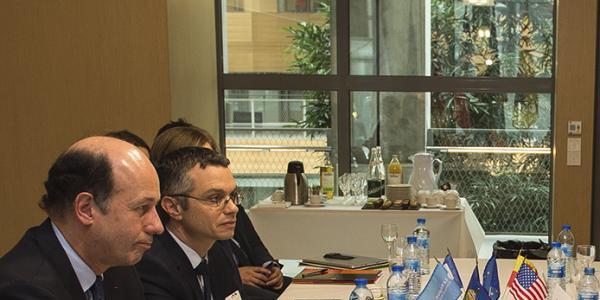
The University of Pittsburgh strengthened its existing partnerships with European institutes with a trans-Atlantic trip in April by Pitt officials, including Chancellor Patrick Gallagher, to renew agreements with Newcastle University in England and universities in France.
“Partnerships like the ones we have in Europe and other countries across the world are beneficial not only for the University of Pittsburgh’s research efforts, but also for our students and faculty, who get a taste of each country’s unique academic offerings through our exchange programs. In turn, students and faculty from these partner institutions also get a taste of the city of Pittsburgh’s culture,” said Ariel Armony, University Center for International Studies director and vice provost for global affairs, who traveled with the chancellor, as well as with European Studies Center Director Jae-Jae Spoon and Associate Director Allyson Delnore.
Along with this recent visit, Pitt, the City of Pittsburgh and the Danish Energy Agency in March entered into a partnership to collaborate on energy planning and research.
Newcastle University
Pitt entered into an agreement in 2016 with Newcastle University in the United Kingdom for an undergraduate student exchange program, allowing one student per year on either side to study at the partner institution for one semester or one year.
The agreement between Pitt and Newcastle University was renewed in April, signifying the strength of the partnership to explore new avenues for cooperation across several disciplines. To date, there have been a dozen exchanges of faculty and graduate students who have conducted research in history, chemistry, physics, Latin American studies and engineering and shale policy. While abroad, the scholars participate in public engagement activities, teaching projects and staff and student exchanges.
“Though an ocean divides us, the similarities between Newcastle University and the University of Pittsburgh are compelling and clear,” said Gallagher. “I am grateful for our shared values — and the warm welcome we’ve received — and I look forward to continuing to work together to change the world in powerful and positive ways.”
Partnerships in France
In France, Pitt has had agreements with INSA Lyon; Sciences Po Lyon; University of Lyon II and Université Jean Monnet, Saint-Etienne, since 2013. The programs include the fields of film studies, European Union studies, urban studies, engineering and policy studies related to energy.
Pitt, Sciences Po Lyon and Université Jean Monnet will exchange study tours of graduate students and faculty working on urban development and policymaking within a wider research network. Their focus, on cities and energy, will be coordinated by Pitt’s European Studies Center.
Pitt’s Study Abroad Office and Department of French and Italian Languages and Literatures are working with Lyon II to develop a comprehensive Pitt in Lyon Panther Program, which will be the main study-abroad site for Pitt students of French at every level, from beginning to advanced. This program is designed so that Pitt students will be able to complete general education requirements in French or English while pursuing French language studies and experiencing life in France.
Discussions have also begun with INSA Lyon to open up new, to-be-determined internship opportunities to Pitt students. In addition, coursework options in trans-Atlantic studies with Sciences Po Lyon are in the works.
Lastly, Lyon II has an existing faculty exchange program where French film professors teach courses for a semester at Pitt, and Pitt faculty teach film courses for a semester in Lyon. Mark Lynn Anderson, director of graduate studies for the Pitt Film and Media Studies Program, and Lyon film professor Sébastien David are set to participate this fall.
“This (faculty exchange) program lets our students have a cultural exchange without needing to travel and vice versa,” said David Pettersen, associate professor of French and film and media studies at Pitt, who taught in Lyon in 2015 as part of the program. “The French higher education system has a much different model of teaching that’s more professor-driven and more about expertise sharing. I brought in the American, conversational, dialogue-driven style of pedagogy that French students hadn’t had the chance to experience.”
So far, the exchange has been limited to faculty, but there are plans to include students from both institutions starting in spring 2019.
Danish Energy Agency
Another new collaboration promises to take shape in Pittsburgh itself as well.
At the University’s Energy GRID Institute in March, Mayor Bill Peduto, Danish ambassador to the U.S. Lars Gert Lose and Gregory Reed, director of Pitt’s Center for Energy and the Energy GRID Institute, signed an agreement to build an exchange between Pittsburgh’s energy decision-makers and Danish experts to develop more sustainable, low-cost and resilient energy systems.
Copenhagen and Pittsburgh will share best practices in energy design, and Danish experts will offer details of Denmark’s energy initiatives for application to the Pittsburgh region. A future goal is to enhance the implementation of community microgrids for both thermal and electric power supply to parts of the region.
In addition, the University plans to provide its own energy experts through its Center for Energy, housed in the Swanson School of Engineering, and the GRID Institute, to collaborate with the Danes and the city. Pitt’s plans also include helping to build a data-driven model to increase sustainability for the city without creating financial burden, Reed said.
“Not only will this partnership help to cement Pitt’s work in district energy and microgrids, it will also afford us the opportunity to attract further investment towards projects in the city itself, which is needed for deploying more resilient, clean and intelligent energy infrastructures,” said Reed.
Read the PittWire story.

